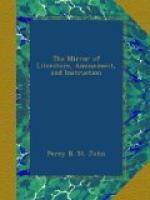Though varying themes demand my future lays,
Yet thus my soul a willing homage pays
To that bright glory which illumes thy name,
Though naught can raise the splendour of thy fame!
Mr. Bird is also advantageously known as the author of the Vale of Slaughden; Poetical Memoirs; Dunwich, a tale of the Splendid City; and other poems, which abound with vivid imagery, life-breathing incidents, and interesting narrative; though it is but late justice to recommend his Framlingham to the admirers of fervid verse.
* * * * *
SPIRIT DRINKING.
“Nothing like the simple element
dilutes
The food, or gives the chyle so soon to
flow.”
The direful practice of spirit-drinking seems to have arrived at its acme in the metropolis. Splendid mansions rear their dazzling heads at almost every turning; and it appears as if Circe had fixed her abode in these superb haunts. Happy are those who, like Ulysses of old, will not partake of her deadly cup. If the unhappy dram-drinker was merely to calculate the annual expense of two glasses of gin per day, he would find a sum expended which would procure for him many comforts, for the want of which he is continually grumbling. If this sum is expended for only two glasses of spirits, what must be the expense to the habitual and daily sot, who constantly haunts the tap-room or the wretched bar? to say nothing of the loss of time, health, and every comfort.
Dr. Willan says—“On comparing my own observations with the bills of mortality, I am convinced that considerably more than one-eighth of all the deaths which take place in persons above twenty years old, happen prematurely, through excess in drinking spirits.”
Spirits, like other poisons, if taken in a sufficient quantity, prove immediately fatal. The newspapers frequently furnish us with examples of almost instant death, occasioned by wantonly swallowing a pint or other large quantity of spirits, for the sake of wager, or in boast.
Dr. Trotter says—“We daily see, in all parts of the world, men who, by profligacy and hard-drinking, have brought themselves to a goal; yet, if we consult the register of the prison, it does not appear that any of these habitual drunkards die by being forced to lead sober lives.” And he contends, that “whatever debility of the constitution exists, it is to be cured by the usual medicinal means which are employed to restore weakened organs. But the great difficulty in these attempts to cure inebriety is in satisfying the mind, and in whetting the blunted resolutions of the patient; and this is, doubtless, more easily accomplished by a gradual abstraction of his favourite potations.”
Dr. Lettsom mentions a person who usually drank twelve drams a day; but being convinced of his approaching misery, took the resolution to wean himself from this poison. He always drank out of one glass, into which he daily let fall a drop of sealing-wax. By this means he had twelve drops less of spirit every day, till at length, his glass being filled with wax, his habit was cured.




